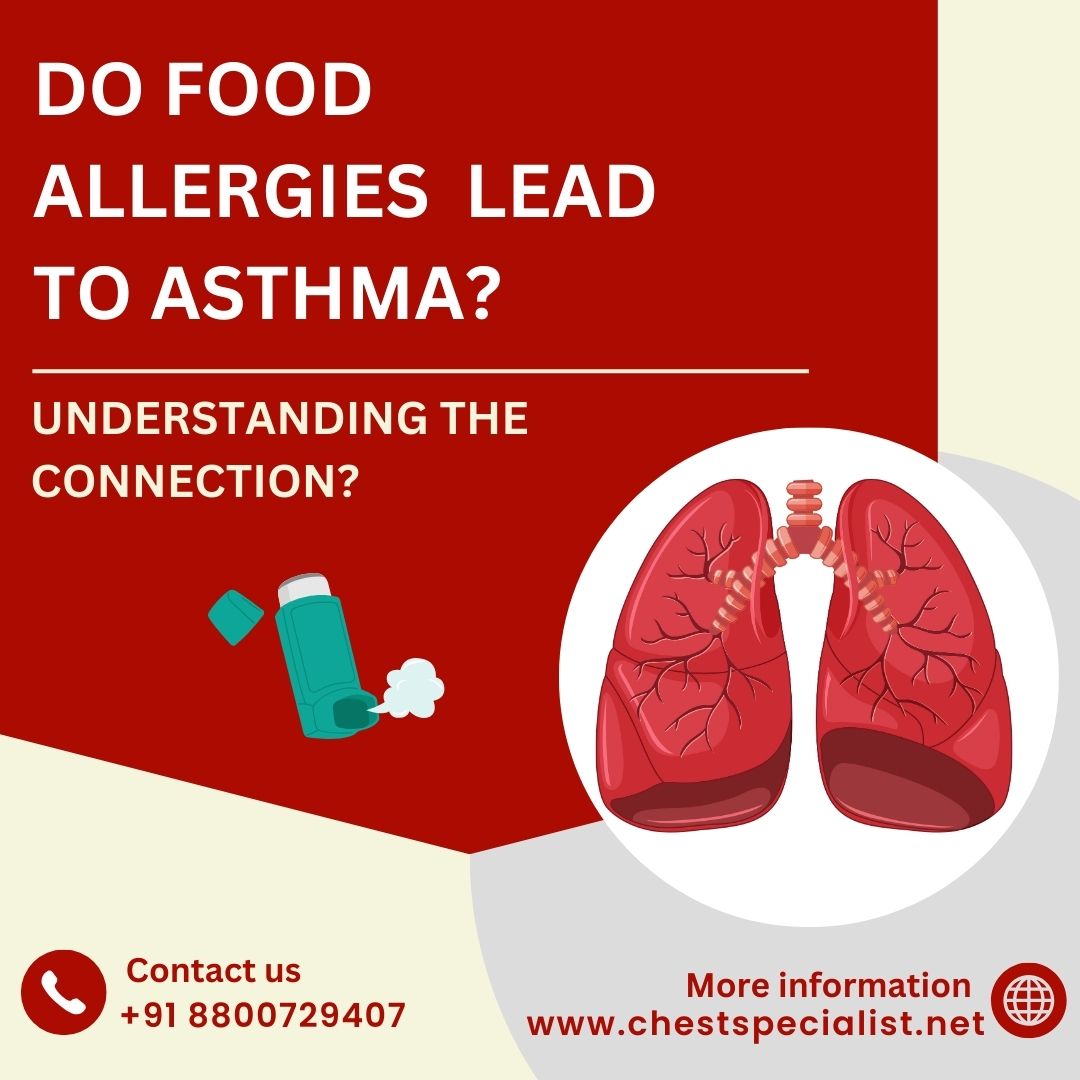chestspecialist development2024-12-03T09:40:53+00:00
Asthma and food allergies are common conditions that often coexist, leaving many wondering whether food allergens can cause or trigger asthma symptoms. While food allergens don’t directly cause asthma, they can significantly worsen symptoms in individuals who already have the condition. If you or your child experience both asthma and food allergies, understanding their connection is key to better management.
In this blog, the experts at Chest Clinic, your trusted asthma specialist in Janakpuri, explore how asthma and food allergies are related, the symptoms to watch out for, and strategies to manage both conditions for a healthier life.
The Link Between Asthma and Food Allergies
Though food allergens do not directly cause asthma, they can trigger or exacerbate asthma symptoms. Asthma and food allergies are both immune system disorders, and studies show that individuals with one are more likely to have the other. Research indicates that up to 40% of children with food allergies also have asthma.
Here’s how asthma and food allergies are interconnected:
- Shared Immune Responses
Both asthma and food allergies involve hypersensitivity reactions. In asthma, the immune system overreacts to triggers like pollen or dust, causing airway inflammation. Similarly, food allergies cause the immune system to misidentify certain proteins as harmful, triggering an allergic response. - Increased Severity of Reactions
Individuals with asthma are at a higher risk of severe allergic reactions. For instance, an allergic reaction to food can quickly escalate into an asthma attack, potentially leading to life-threatening complications like anaphylaxis. - Triggering Asthma Symptoms
Exposure to food allergens can worsen asthma symptoms, particularly if asthma isn’t well-controlled. Proper management of both conditions is critical. - Cross-Reactivity
Some people with food allergies may also experience cross-reactivity to other allergens like dust mites or pollen, which can further aggravate asthma symptoms.
Symptoms to Watch Out For
For individuals with both asthma and food allergies, it’s crucial to recognize overlapping symptoms and signs of severe reactions. Anaphylaxis, often caused by food allergens, can lead to swelling of the airways and trigger asthma attacks. This combination is especially dangerous for individuals with poorly managed asthma.
Key symptoms to monitor include:
- Worsening wheezing or shortness of breath after eating certain foods
- Throat swelling leading to breathing difficulties
- Hives or rashes accompanied by respiratory issues
- Persistent coughing after consuming an allergen
In severe cases, immediate treatment with an inhaler or an epinephrine auto-injector is essential.
Managing Asthma and Food Allergies Together
Managing asthma and food allergies simultaneously can prevent severe health complications. As a leading asthma specialist in Janakpuri, Chest Clinic recommends the following steps:
- Avoid Known Allergens
If you or your child has been diagnosed with food allergies, avoid allergens completely. Always check food labels, exercise caution when dining out, and inform others about food allergies to prevent accidental exposure. - Maintain Asthma Control
Proper asthma management includes taking prescribed medications, using rescue inhalers when necessary, and avoiding known asthma triggers like smoke, pollution, and cold air. - Carry Emergency Medications
Always have an epinephrine auto-injector (EpiPen) and a rescue inhaler on hand, especially for individuals at risk of anaphylaxis. Ensure family members, friends, and caregivers are trained to use these devices. - Create an Action Plan
Work with your allergist or pulmonologist to create a personalized asthma and allergy action plan. This plan should detail the steps to take during an asthma attack or allergic reaction.
Conclusion
Food allergens might not directly cause asthma, but they can significantly worsen symptoms or trigger severe reactions in individuals with both conditions. By understanding the connection between food allergies and asthma, you can take proactive steps to prevent complications and manage both conditions effectively.
If you suspect that food allergies are contributing to asthma symptoms, consult a child allergist or pulmonologist at the Chest Clinic in Janakpuri. With the right diagnosis, treatment, and management plan, you can ensure better health and safety for yourself or your loved ones.
Chest Clinic – Expertise You Can Trust
For comprehensive care from the best asthma specialist in Janakpuri, contact us today. Let us help you breathe easier and live healthier!


Leave a Reply